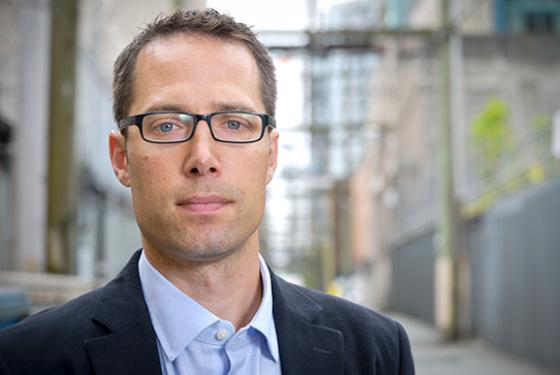
Addictions specialist Dr. Evan Wood shares his goals for addiction treatment and care in B.C. as he takes on the new role of Medical Director for Addiction Services at the Vancouver Coastal Health.
At the helm of a new partnership between the Vancouver Coastal Health (VCH) and the British Columbia Centre for Excellence in HIV/AIDS (BC-CfE) focusing on untreated addictions is specialist Dr. Evan Wood. Dr. Wood has recently been appointed as the Medical Director for Addiction Services at VCH as part of a greater effort to bridge the gap between addictions clinical education leadership and clinical research that will ultimately guide clinical care in the province.
Q: How does your work with the BC Centre for Excellence in HIV/AIDS relate to this new position at VCH?
A: A lot of my earlier work was in the area of HIV medicine and B.C. has really done an amazing job with that in the Downtown Eastside (DTES). For example, there has been more than 90% reduction in new HIV cases since the peak of the epidemic and a similar reduction in AIDS deaths. However, among the health challenges that remain in the DTES is the problem of untreated addiction.
Q: What are you hoping to accomplish as the Medical Director for Addiction Services at VCH?
A: There are still major challenges and questions around how best to respond to untreated addiction. VCH has a wonderful group of primary care physicians who are highly skilled in addiction medicine but there are still gaps in the system in terms of the use of evidence-based treatments and treating addictions effectively. Certainly, the traditional lack of training for physicians in addiction medicine is one of the structural barriers to care for addiction-affected populations and it’s now a focus of my research.
Overall, the goal is to recognize addiction as a brain disease and then to apply the same principals that have helped reduce the societal burden from other diseases. That involves training physicians with the skills to best take care of the patients as well as conducting ongoing research, particularly aimed at expanding access to effective treatments, and to identify new tools that can support evidence-based health service delivery. It’s often difficult to train physicians in this type of research because of their already full schedules and professional obligations.
Q: How does research focusing on HIV and addictions impact B.C.’s health care system?
A: Reduction in HIV among persons with addictions and the implications in terms of cost for health care system are substantial. On average, each case of HIV infection costs about $500,000 in medical costs; to have a 90% reduction in new HIV cases not only serves the public in terms an infectious disease not being transmitted at nearly the same rate, but it also reduces the financial strain on our health care system.
Our research has direct relevance to the broader population and to individuals who don’t feel they’re affected by addiction. Ultimately it interrupts the intersection of drug markets, criminal activity, and petty crime committed by people to serve their addiction.
Greater recognition of addiction as a brain disease, and opportunities to learn about addictive disorders so they can be prevented and treated, makes for better health outcomes.
Q: What is the Addiction Medicine Fellowship?
A: In 2012 we received a $3 million donation to establish the St. Paul’s Hospital Goldcorp Addiction Medicine Fellowship, which is a partnership between the St. Paul’s Hospital Foundation, VCH and UBC. The fellowship strives for excellence in clinical training, scholarship, research and advocacy and involves medical education about addiction to trainees from family medicine, psychiatry and internal medicine. Our first research day was May 9, 2014, and it was inspiring to see the fellows present their research.
Dr. Wood is a co-director of the Addiction and Urban Health Research Initiative at the British Columbia Centre for Excellence in HIV/AIDS, Professor of Medicine at the University of British Columbia (UBC) and an attending physician at St. Paul’s Hospital. Dr. Wood is also the Principal Investigator and Director of the Canada Addiction Medicine Research Fellowship, a US National Institute on Drug Abuse-funded research training program for physicians with a background in addiction medicine based out of UBC, VCH and St. Paul’s Hospital.


